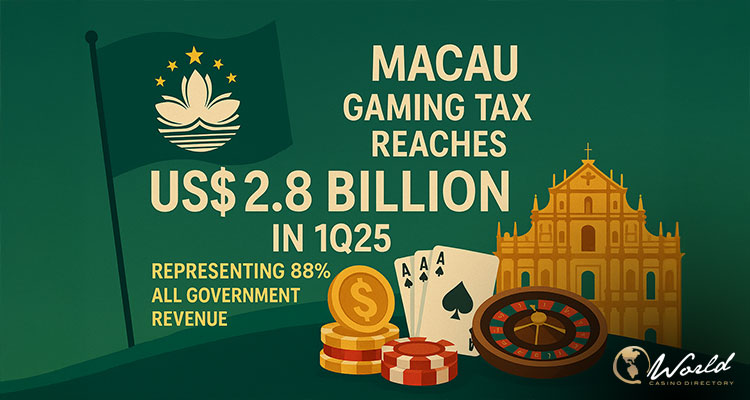Macau’s government reported a collection of approximately MOP22.20 billion (US$2.78 billion) in gaming taxes for the first quarter of 2025, a marginal 0.2% increase compared to the same span last year, according to figures published by the city’s Financial Services Bureau (DSF) last Thursday and cited by GGRAsia.
Under the updated gaming concession system initiated on January 1, 2023, casino operators are subject to an effective tax rate of 40% on their gross gaming revenue (GGR). The new structure, lasting a decade, not only tightened government control over the industry by limiting concessions to six operators but also emphasized diversification, compelling licensees to invest in non-gaming sectors. Recently, Macau‘s Secretary for Economy and Finance, Tai Kin Ip, reiterated the call for concessionaires to boost non-gaming investments to help stabilize and broaden the city’s economy.
Gaming Revenue Growth Remains Modest
The slight rise in gaming tax revenue mirrors the tepid growth in GGR during the period. Aggregate GGR for January through March 2025 reached MOP57.66 billion, a 0.6% increase year-on-year, according to the Gaming Inspection and Coordination Bureau (DICJ). March alone saw gaming revenue of MOP19.66 billion, showing a minor 0.8% uptick compared to March 2024, although it slipped 0.4% from February’s figures.
Importantly, the correlation between recorded GGR and tax revenue figures is not immediate, due to reporting lags between casino revenue generation and official tax registration. As a result, while the March gaming tax intake totaled MOP7.95 billion (US$996 million), this amount reflects gaming performance predominantly from February.
Gaming Taxes Continue to Anchor Macau’s Budget
Gaming taxes remain the foundation of Macau’s public finances. In the first quarter of 2025, these taxes constituted 88.1% of the city’s total government revenue, which amounted to about MOP25.2 billion (US$3.15 billion). The government’s 2025 fiscal plan aims for MOP93.12 billion (US$11.6 billion) in gaming tax revenue. However, with the first quarter accounting for only 23.8% of that target, officials may need to recalibrate their projections.
Macau’s Chief Executive, Ho Iat Seng, addressed this challenge in his Policy Address for Fiscal Year 2025, indicating that adjustments to the budget could be necessary based on evolving GGR expectations and pending expenditure requirements.
The slow pace of growth has also prompted financial institutions to reassess their forecasts. The International Monetary Fund (IMF) recently trimmed Macau’s projected GDP growth for 2025 to 3.6%, down sharply from an earlier estimate of 7.3%.
Early Year Fluctuations Reflect Sector Volatility
Data from the DSF further shows that during January and February 2025, the government collected MOP14.24 billion in gaming tax, a 3.8% drop compared to the same months in 2024. Despite this early dip, March’s performance helped balance the quarter’s final outcome. Overall, gaming taxes contributed significantly, comprising 89.3% of Macau’s total tax revenue in the first two months of the year.
In a broader context, Macau’s gaming industry had shown strong recovery momentum throughout 2024, with total gaming tax collections rising to MOP88.1 billion—an impressive 35.0% leap from MOP65.3 billion in 2023. Yet, December 2024’s tax intake of MOP7.08 billion, despite posting a 14.4% year-on-year increase, still reflected a 13.0% decline compared to November’s figures, highlighting persistent volatility in monthly revenues.


